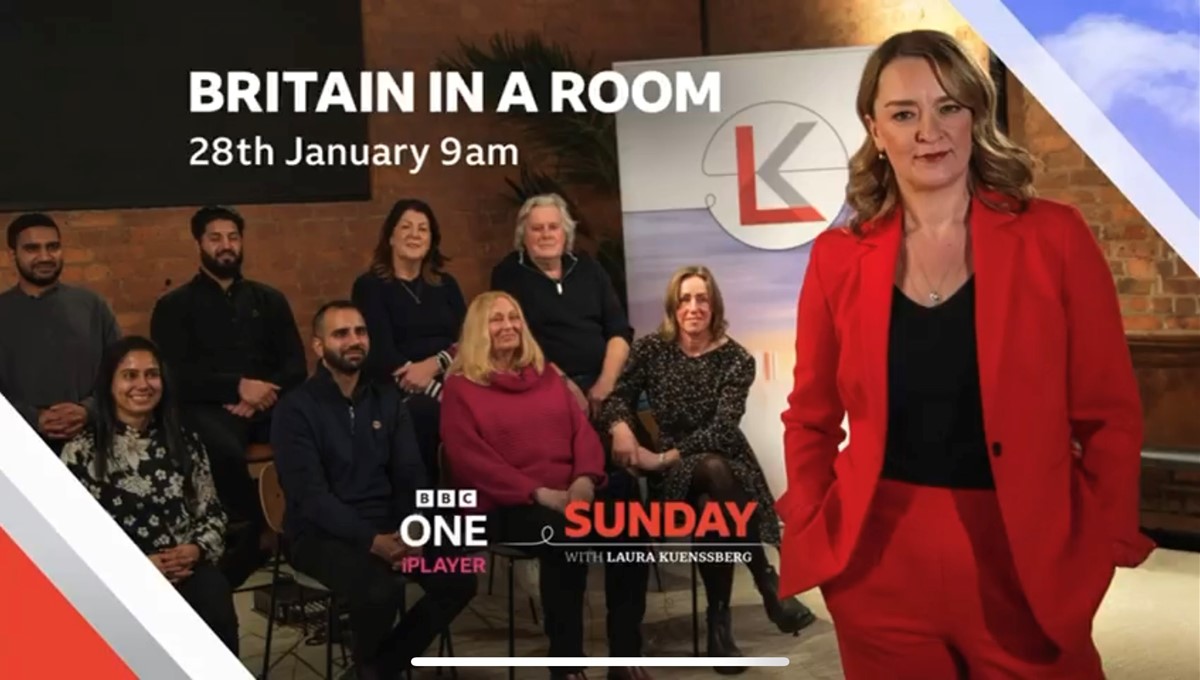Earlier this week, More in Common brought together a series of six focus groups for the BBC’s Sunday with Laura Kuenssberg show. This short explainer gives some background to how and why we selected these particular groups:

Where are the participants from?
The participants are drawn from six parliamentary seats in the Greater Manchester area: Bury North, Bury South, Heywood and Middleton, Leigh, Burnley and Bolton North East.
Why were these areas chosen?
All of these seats switched from Labour to Conservative at the 2019 election. Seats like these, most of which had previously had a long history of voting Labour, have become known as ‘The Red Wall’. Their switch from Labour to Conservative defined many of the contours of the current Parliament. The next election will show whether these seats stick with the Conservatives or switch back to Labour, helping to determine what the next Parliament will look like and who’s in No. 10 after the election.
How did you decide what groups of voters to talk to?
More in Common convened six different groups of voters to try and best understand why voting intentions have shifted (or not) since the last election:
- Those who voted Conservative in 2019 and intend to vote Conservative
- Those who voted Labour in 2019 and intend to vote Labour
- Those who are intending to vote Liberal Democrat or Green
- Those who are intending to vote Reform UK
- Those who voted Conservative in 2019 and are now undecided
- Those who voted Conservative in 2019 and intend to vote Labour
Looking at More in Common’s most recent voting intention Sankey chart, you can see that these groups broadly represent the different changes in voting behaviour over the course of the current Parliament.
Why didn’t you just speak to undecided voters?
Undecided voters are an important voter block, but they alone won’t determine the result of the next election - just as important will be those voters who are switching parties and who are sticking with the party they voted for in 2019. To properly understand how voters are thinking about the next election and the leaders of the two main parties it is important to speak to all these groups.
How were participants selected?
More in Common used independent recruiters across the six areas to select participants. All participants went through a two-part screening process before being confirmed as participants. Participants were not selected on the basis that they volunteered to talk about politics and only told the subject matter in the second screening.
What did you ask people about?
Participants were asked about a range of topics - with a focus on their views on the state of the UK, the biggest issues affecting their lives and their views on the leaders of the two main Westminster parties.
Why are focus groups useful?
Week in, week out, More in Common’s researchers speak to voters in focus groups across the country to understand their thoughts, feelings and perspectives. How the public talk about the state of the country, our political leaders and their priorities in their own words, is often much more illuminating than the headline numbers we get from polling alone. It is sometimes said that while polling tells you what people think, focus groups help to understand why people think it.
More in Common strongly believes that politicians, policy makers and everyone interested in public life, benefits from hearing directly from the public, which is why we were delighted to partner with Sunday with Laura Kuenssberg for this project.
Are you using these focus groups to predict the election?
No, More in Common, and other British Polling Council members conduct regular voting intention polling. That polling, while not always perfect and only a snapshot, gives us the best and most robust way of understanding how people are currently likely to vote. Focus groups do a different job and help to provide a deeper understanding of what is shaping that headline public opinion.
How long was each focus group?
Each focus group ran for 45 minutes to an hour. Airing all of this content would be impossible which is why the key highlights have been collated to air on Sunday with Laura Kuenssberg and elsewhere. While editorial decisions about what to include sit with the BBC, More in Common’s moderators believe it provides a fair and accurate depiction of the key themes, topics and sentiments that emerged during the focus groups.
For any more information about these groups, please contact: luke@moreincommon.com
You can find out what these groups said on 'Sunday with Laura Kuenssberg' on BBC One at 9am on Sunday 28th January 2024 or afterwards on BBC iPlayer